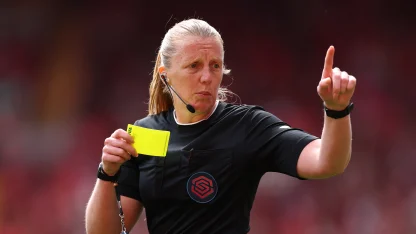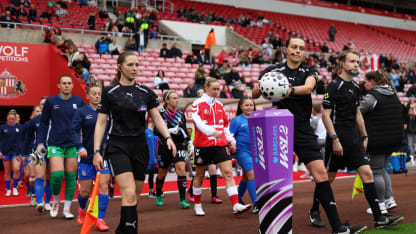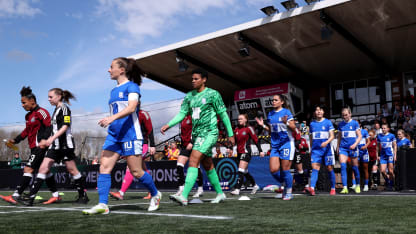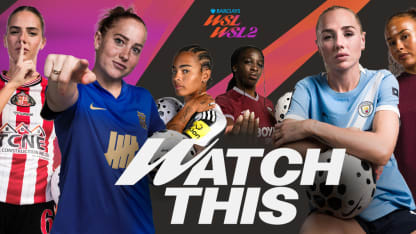What To Expect From Match Officials In 2025/26

With the 2025/26 Barclays WSL and Barclays WSL2 season almost upon us, here’s what to expect from match officials across the women’s professional game in England.
Match officials will be empowered this season to:
- Apply changes to updated Laws of the Game, including key changes affecting goalkeepers, dropped ball restarts and penalty-kick procedures
- Continue to take a robust approach to participant behaviour, including player conduct and technical area discipline, with a new emphasis on applying the ‘Captains Only’ approach
- Protect player welfare, especially around head injuries, while deterring tactics designed to delay or disrupt the game
- Maintain a high threshold for penalising challenges, recognising that not all contact is a foul while ensuring player safety
A summary of the key IFAB Laws of the Game changes are below:
Goalkeeper eight-second rule
Goalkeepers now have a maximum of eight seconds to release the ball once they have gained control.
Control includes:
- Holding the ball between the hands / arms or between the hands / arms and any surface
- Holding the ball on outstretched open hands
- Bouncing or throwing the ball
Referees will determine when the eight second count begins and will raise an arm to signal the final five seconds. The count will only begin once the goalkeeper has full control of the ball and is able to release it unhindered by opponents.
If the goalkeeper exceeds eight seconds, a corner kick will be awarded to the opposition, taken from the side of the field nearest to the goalkeeper.
Dropped ball restarts
If play is stopped with the ball inside the penalty area, the restart will be a dropped a ball to the goalkeeper.
If play is stopped outside the penalty area, the dropped ball will go to the team that had (or would likely have gained) possession, from the position when play was stopped.
Inadvertent interference
In the event of inadvertent interference e.g. by a member of the technical area or a substitute warming up, with the ball when it is still in play, the game will be restarted with an indirect free kick and no sanction
If the interference is clearly deliberate and impactful, the game will be restarted with an indirect free kick or penalty kick, as well as appropriate disciplinary action.
Double touch at penalty kicks
Where a penalty taker accidentally kicks the ball with both feet simultaneously or the ball touches their non-kicking foot or leg immediately after the kick:
- If a goal is scored, the kick must be retaken
- If no goal is scored, an indirect free kick will be awarded
If the penalty taker makes a deliberate double touch then they will be penalised with an indirect free kick, regardless of goal outcome.
In addition to implementing the above Laws of the Game changes, match officials continue to receive full backing from the football authorities to implement key management strategies introduced over the past few seasons.
This includes a firm stance on unacceptable behaviour, improved timekeeping measures and a focus on enhancing the overall flow and fairness of the game – both on the pitch and in the technical area.
The ‘Captains Only’ approach will serve as an additional management tool for referees in key moments. While normal communication between referees and players will continue, only the captain will be invited to approach the referee to explain important decisions, with the expectation that they help guide team-mates away.
Clear visual gestures, including a ‘stop’ signal and pointing to an imaginary armband will be used to reinforce this.
Referees will continue to be supported in their efforts to protect player welfare while managing the overall flow of the game.
In line with last year’s principles, officials will ensure that players who require medical assessment do so in a way that prioritises safety, prevents tactical disruption and minimises unnecessary stoppages.
Key objectives remain:
- Protect player welfare – ensuring any potential injury is assessed quickly and appropriately, with sufficient time for treatment off the field
- Deter players from requesting attention as a tactic to waste time or break the momentum of the game
- Minimise delays to the restart of play wherever possible
Process for injury management (excluding suspected head injuries):
- Where on-pitch assessment is required, the referee will ensure the player is removed from the field as efficiently as possible
- Treatment will take place off the field, unless specific exceptions apply under Law 5 (e.g. injured goalkeeper or serious injury)
- Once play resumes, the player will remain off the pitch for a minimum of 30 seconds after play has re-started, with their return subject to the referee or fourth official’s permission
- If a team-mate clearly delays or refuses to restart the game during this time, that player will be cautioned
In all cases involving a suspected head injury, match officials will follow a defined welfare-first protocol:
- The referee will immediately signal for the team doctor or physio to enter the pitch as soon as play is stopped
- The player will be removed from the field and remain on the touchline for a minimum period of 30 seconds after the game has restarted
- The player may only return to play with the permission of the referee or fourth official
Officials will continue to ensure a fair and accurate management of match time whilst remaining empowered by the game to take a more robust approach to dealing with clear and deliberate actions that are impactful in delaying the restart of play. A more accurate calculation of additional time will continue to include:
Goal – Added time clock to start after 30 seconds
Substitution – Exact time (play stopped to restart)
Injury – Exact time (play stopped to restart)
Penalty Kick – Exact time (award to restart)
Delaying restart/time wasting (e.g. ceremonial free-kicks, goal kicks) – Referee to make allowance based on match events
Red card – Exact time (red card shown to restart)
VAR check/review delays restart – Exact time
As the tempo and physicality of the game continues to be recognised, match officials will maintain a high threshold for penalising contact with the continued emphasis that not every challenge constitutes a foul, whilst ensuring player safety.
Likewise, holding remains a continued area of focus in 25/26. Referees will be supported in identifying offences where a player’s contact impedes an opponent’s movement.
Officials will consider both the nature of the action and its impact on the opponent’s opportunity to play or challenge for the ball.
The considerations:
- Sustained and/or impactful holding
- Clear impact on the opponent’s opportunity to play or challenge for the ball
- Clear non-footballing action with impact on the opponent’s movement
What to look for:
- Only focusing on the opponent (not looking at the ball) or paying no attention to challenging or playing the ball likely to result in being penalised
- Holding while clearly ignoring the ball (non-footballing action) is an offence
- Mutual holding is usually not penalised
A less is more approach to handball will be maintained, recognising that not every instance of contact between a player’s hand or arm and the ball constitutes an offence. The focus remains on letting the game flow while penalising only those handball situations that clearly meet the criteria for an offence.
No handball offence mitigating factors:
- Justifiable position / action
- Supportive arm
- Player plays ball onto own arm
- Clear change of trajectory when touched by same player
- Played by a teammate
- Proximity
Handball offence considerations:
- Deliberate movement of arm to the ball
- Clear additional arm movement to the ball after it has hit another body part
- Arm makes body bigger as a result of being in an unjustifiable position



